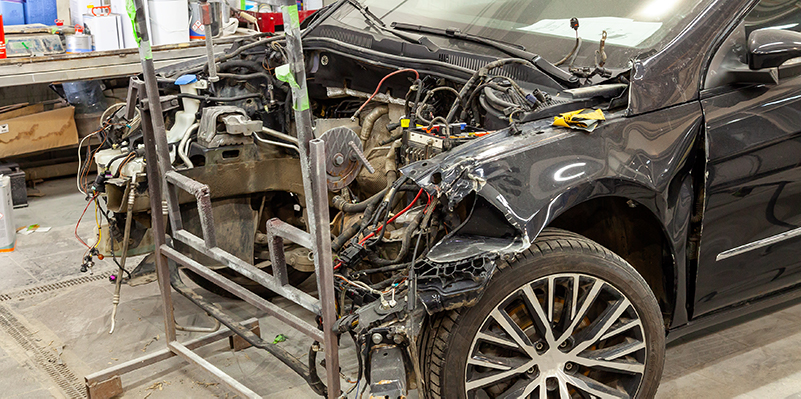
“What are the laws pertaining to an insurance company leaving a car at a repair shop because they do not want to pay the bill? Specifically relating to a totaled car? As a shop, we put our money out there for sometimes 30 days or more on a payout from a towing company and we apply a 25-percent markup, $100 administration fee, teardown time, frame time if necessary, post-repair scan time and, of course, storage. I would like to know the answer for my state, and I’m sure other shop owners in the country would like to know also.” – Chris Lane, owner, Wheel 2 Wheel, Oak Ridge, Tenn.
Even though I don’t have enough time to research your particular state’s laws and regulations, I can respond in a way that will be beneficial to all body shop owners regardless of what states they’re in.
The quick response is: I don’t know. However, based on the experience of my coaching/consulting clients, in most states insurers cannot legally abandon a vehicle at a shop. However, you, like most other shop owners, are failing to see who truly owes who, and it’s imperative that, as a business owner, you do know this and fully understand the relationships involved. So let’s address this issue by issue.
Know the Law
Every business owner (and their management) should know and understand the laws, regulations, codes and rules that govern their business in their state and municipality and also the laws that govern the responsibilities and conduct of insurers. I can promise you that insurers know their responsibilities and those of the collision repairer. They may not always follow them, but you can be assured they know them well.
Who Do You Work For?
It’s important that repairers fully understand who it is they work for and where the responsibilities lie. Most states recognize the “customer” as the one who signed the repairer’s repair authorization/contract, and as such, under most state laws, it is the customer who is responsible to provide payment to the repairer for their services. While we can all agree that the “customer” may be relying on the insurer’s payment to pay their bill, the customer is the one who owes the repairer and pays – not the insurer.
Who Is Responsible?
With this understood, it’s not hard to understand who is truly responsible for the customer’s vehicle and the charges incurred regarding a repairer’s activities, regardless if the vehicle is repaired or deemed to be a total loss. If you said “the customer is responsible,” you would be spot on.
The only time this may differ is when:
- The repairer is a DRP “partner” and a special agreement/contract has been entered into that limits the repairer’s rights and holds the insurer harmless. (You stated that the issues you were facing did not involve a DRP relationship).
- When an insurer makes a settlement on a total loss and becomes the vehicle’s legal “owner” and exercises whatever rights they may have to take possession…or not. (Note that Auto Damage Experts (ADE) coaching/consulting clients have specific wording in the repair contracts to prohibit such transfer of rights relative to the repair authorization/contract.)
The bottom line here is that your true “customer” (as defined by your specific state’s regulations) is responsible for the charges incurred due to your company’s activities on their behalf.
While an insurer may threaten to abandon the vehicle if you insist on charging your customer for services rendered, their threat may be hollow and without merit. If an insurer refuses to provide payment for your customer’s legitimate charges, you should still seek payment from your customer and encourage your customer to seek recompense from the responsible insurer, whether it is their own insurer or the at-fault driver’s.
Consider that your customer has entered into a contractual agreement with your company, and so they are obliged to honor it completely, which includes full payment of your billing and removal of their vehicle. A thorough and well-crafted repair authorization/contract is the first thing ADE assists our clients with.
As the humble service provider, you have done your part, and now you’re entitled to be compensated for your time, materials, administrative efforts and the associated liabilities you have incurred.
When you seek payment from your “customer,” they then should turn their attention to the responsible insurer for proper payment to resolve their claim. Trust me when I tell you, this will grab the insurer’s attention much more than a shop going after them for payment.
Like many repairers, when you seek payment from an insurer, “you’re barking up the wrong tree.” Unless the insurer has engaged you to repair one of their company’s fleet vehicles, the insurer doesn’t owe you anything…it’s your true “customer” who owes your company everything.
This is often hard for most repairers to grasp due to “the way it’s always been done,” but understanding it and acting upon it is an important part in garnering the true independence needed for the profitability, long-term success and continued growth of your company. B
Barrett Smith, AAM, is the founder and president of Auto Damage Experts Inc., which has been providing automotive inspection and expert legal services nationwide since 1997. He can be reached at (813) 657-6705.













